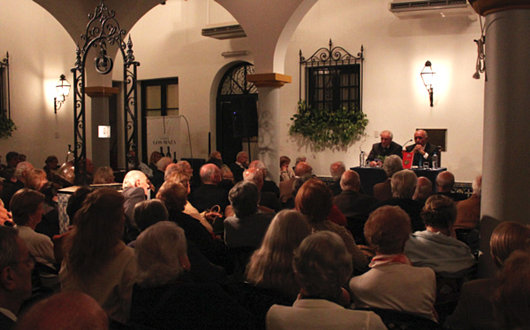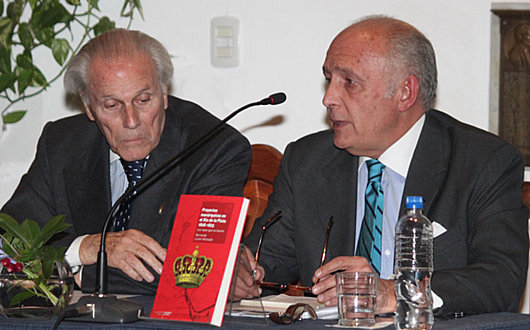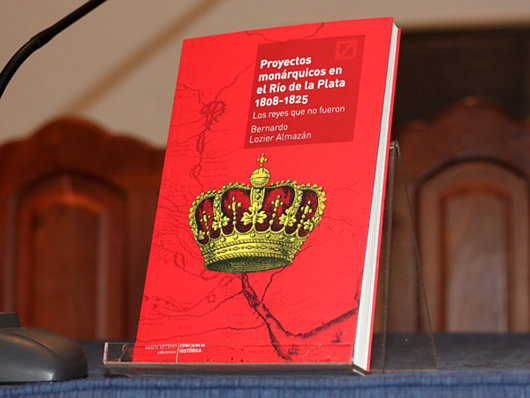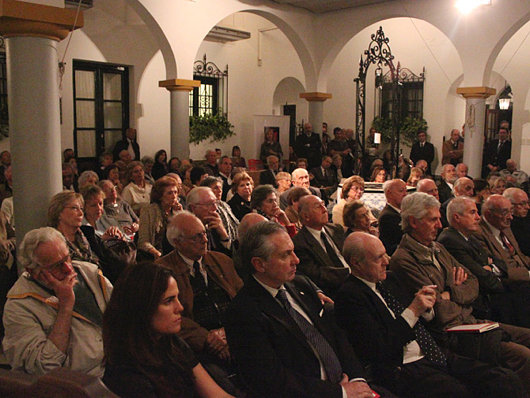
About Andrew Cusack
 Writer, web designer, etc.; born in New York; educated in Argentina, Scotland, and South Africa; now based in London.
Writer, web designer, etc.; born in New York; educated in Argentina, Scotland, and South Africa; now based in London. read more
News
Blogs
Reviews & Periodicals
Arts & Design
World
France
Mitteleuropa
Knickerbockers
Argentina
The Levant
Africa
Cape of Good Hope
Netherlands
Scandinavia
Québec
India
Muscovy
Germany
Academica

A Rioplatense Kingdom?
New book explores the monarchic projects of the River Plate, 1808–1825
A book recently published in Buenos Aires sheds new light on the difficult transition period between the Spanish Empire on the River Plate and the foundation of the Argentine Republic. The launch party for Bernado Lozier Almazán’s Proyectos monárquicos en el Río de la Plata 1808-1825. Los reyes que no fueron (“Monarchic projects in the River Plate 1808–1825: The kings who weren’t”) was held recently in the Quinta ‘Los Ombúes’, home of the municipal library, museum, and archives of San Isidro, the city in the Provincia de Buenos Aires known as Argentina’s ‘Rugby Capital’.
Proyectos monárquicos highlights the forgotten truth that most of the Argentine ‘patriots’ — San Martín, Belgrano, and Alvear among them — were monarchist, not republican. Proposals involving the courts of Spain, Portugal, France, and even England were proffered, and there was even an interesting proposal to marry a European prince to an Incan princess and offer him the throne of the Río de la Plata.

The author was introduced by Ignacio Bracht, the historian and fellow of the Argentine Institute of Genealogical Sciences, who pointed out the book illuminated Argentines’ roots in a way outside the ‘official’ historiography. “In the early nineteenth century,” Bracht said, “monarchs enjoyed the veneration of their subjects, who saw the king as one who granted them freedom, order, and the unity of peoples — ideals which were seriously violated in the United Provinces.” For this reason, Bracht suggests, monarchists considered the traditional system of government as more appropriate for guiding the “fledgling and hesitant nation” than republicanism. In the author’s own remarks, Lozier Almazán ruminated on what Argentina would be like had any of the projects researched in the book actually succeeded.

Among those present at the book launch were Abp. Edgardo Lisen, president of the Argentine-Urguayan Cultural Institute, Fr. Edgardo Albamonte SSPX, chaplain to the Charles VII Traditionalist Brotherhood (Argentina’s Carlist institute)

Source: Portal Uno
Search
Instagram: @andcusack
Click here for my Instagram photos.Most Recent Posts
- A Christmas Gift from the Governor December 24, 2024
- Oude Kerk, Amsterdam December 24, 2024
- Gellner’s Prague December 19, 2024
- Monsieur Bayrou December 18, 2024
- Dempsey Heiner, Art Critic December 17, 2024
Most Recent Comments
Book Wishlist
Monthly Archives
Categories



Would you know if an English translation is will be published in the future?
Always good to have a new post from you–and today there’s even a second new one behind. Thanks.
Your quotation of the remark about people venerating their monarchical sovereigns reminded me of Nicolas Gomez Davila’s work. You know the English in the period under consideration here were very active in promoting all kinds of political disorder in Latin America in and around taking out Boney. England had already fallen to the modernist liberals and they wanted to spread their errors just like Lucifer. Perhaps this work (Proyectos) is a foreshadowing of a new multi-century period of returning to faith and reason. We’ve certainly seen the end of British ascendancy.
Argentina is perhaps the only nation in South America possessing a relevant traditionalist movement. Do you know the reason for this Mr. Cusack?
“Argentina is perhaps the only nation in South America possessing a relevant traditionalist movement. Do you know the reason for this Mr. Cusack?
— Julian Felsenburgh”
What of Brazil? Liturgically, you have the Personal Apostolic Administration of St. John Vianney. Culturally, you have Tradition, Family, Property (TPF).
~Bonifacius
Cf.: [link]